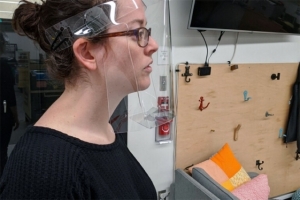MIT researchers develop technique to create 50,000 disposable face shields daily
by
John R. Fischer, Senior Reporter | April 03, 2020

MIT is using a technique called die cutting to produce face shields rapidly to protect providers against spread of the COVID-19 virus.
Researchers at the Massachusetts Institute of Technology are helping to protect physicians exposed to the COVID-19 virus with a new technique that they claim will allow them to produce 50,000 disposable face shields per day in just a few weeks.
Known as die cutting, the process enables quick and low-cost production of face shields, supplies of which are severely depleted worldwide among healthcare providers, along with other pieces of personal protective equipment.
“These face shields have to be made rapidly and at low cost because they need to be disposable,” said Martin Culpepper, professor of mechanical engineering, director of Project Manus, and a member of MIT’s governance team on manufacturing opportunities for Covid-19, in a statement. “Our technique combines low-cost materials with a high-rate of manufacturing that has the potential of meeting the need for face shields nationwide.”
The shortage in face masks has caused providers to resort to wearing one face mask per day. One mask can accumulate virus particles spread through coughing or sneezing and carry them, increasing the spread of COVID-19 within hospitals and endangering healthcare professionals.
“The lack of adequate protective equipment or the idea of reusing potentially contaminated equipment is especially frightening to healthcare workers who are putting their lives, and by extension the lives and well-being of their families, on the line every day,” said Elazer R. Edelman, director of MIT’s Institute for Medical Engineering and Science (IMES) and leader of MIT’s PPE task force.
Face shields provide an added layer of protection that covers masks and entire faces, and extends the life of PPE by protecting against direct contact with virus particles. With die cutting, machines cut a design for a single-piece face shield from thousands of flat sheets each hour. Healthcare professionals can quickly fold the sheets into three-dimensional face shields before adjusting them to the contours of their faces.
Using a laser cutter, Culpepper and his team at Project Manus formed and tested different materials to create prototypes, finally deciding on polycarbonate and polyethylene terephthalate glycol (PETG) as the best material for the shields. The format is a flat design that can quickly fold into a three dimensional structure when the shield is ready to be used, and includes flaps that fold under the neck and over the forehead for added protection.
The team deployed the face shields at a number of area hospitals where physicians wore them in real-life situations and recorded their efficiency in a one-page survey. Participants liked the ease of assembling and using the shields, and noted that they provided good protection against contact with virus particles through splashes or aerosolized particles.
Using the feedback to make a few minor adjustments, the team maximized coverage around the sides and neck of users and has now shifted its focus to high-rate mass manufacturing. It intends to continue ramping up production and will further increase the rate of manufacturing by producing face shields in 80 fabrication facilities across the nation.
“This process has been designed in such a way that there is the potential to ramp up to millions of face shields produced per day,” said Culpepper. “This could very quickly become a nationwide solution for face shield shortages.”
The team collaborated with a number of MIT departments and colleagues, as well as the MIT Medical Outreach team and the Crisis Management Unit, established by vice president for research, Maria Zuber, and directed by Edelman, who is the Edward J. Poitras Professor in Medical Engineering and Science at MIT.
MIT plans to purchase the first 40,000 face shields and donate them to local Boston-area hospitals this week. The fabrication facilities will donate 60,000.
|
|
|
You Must Be Logged In To Post A Comment
|
